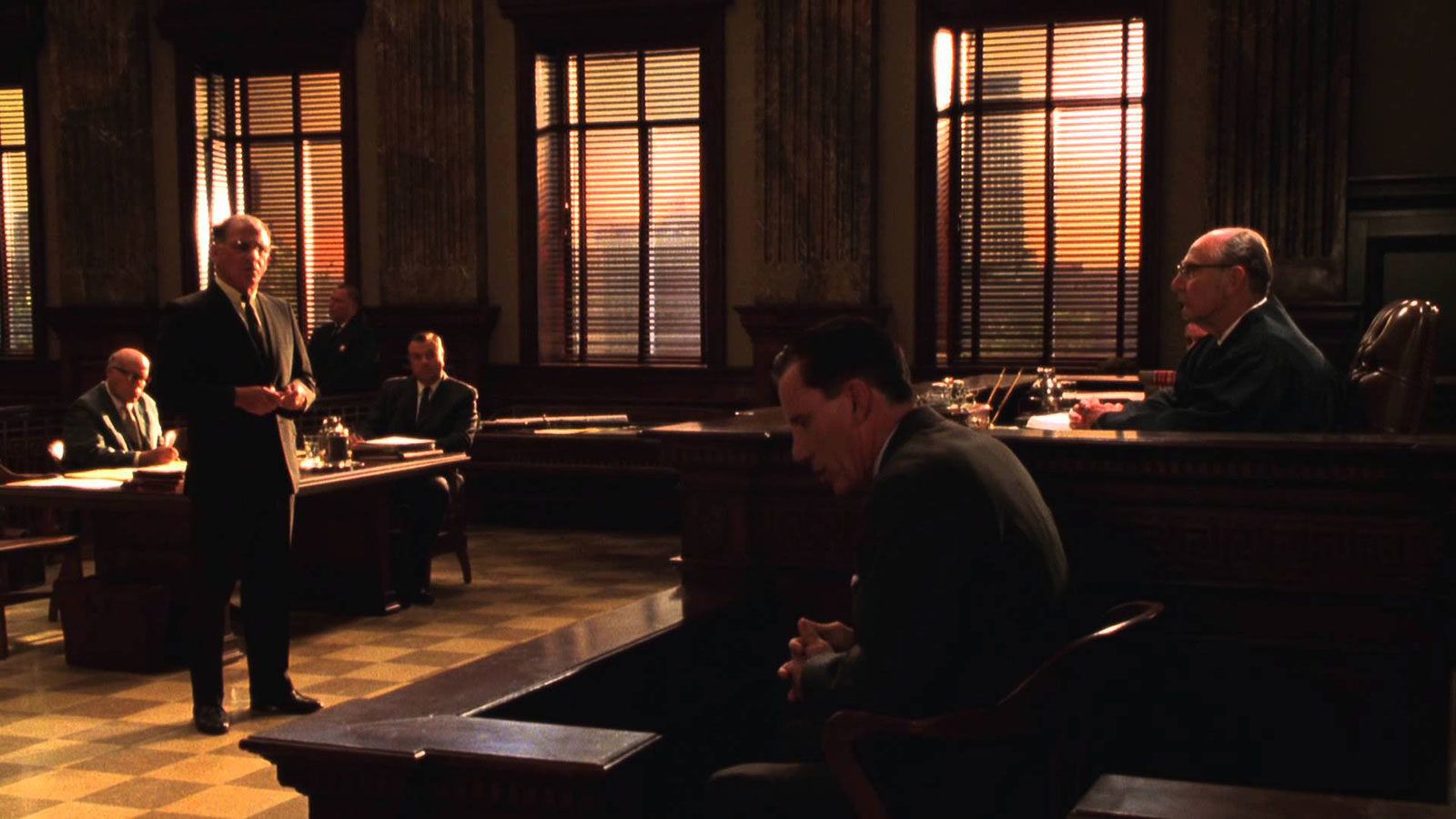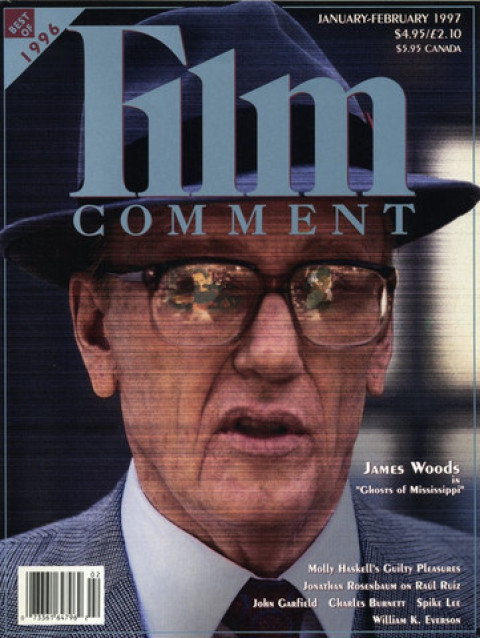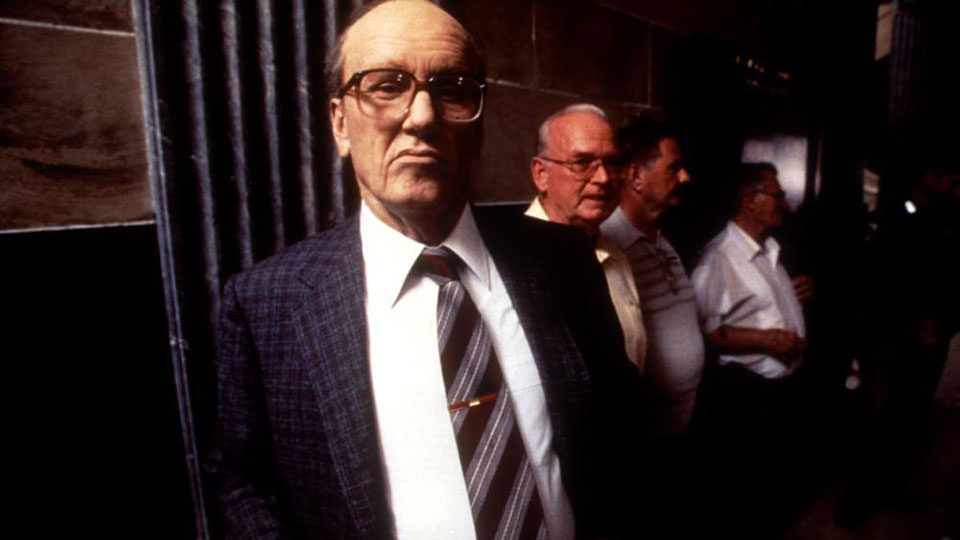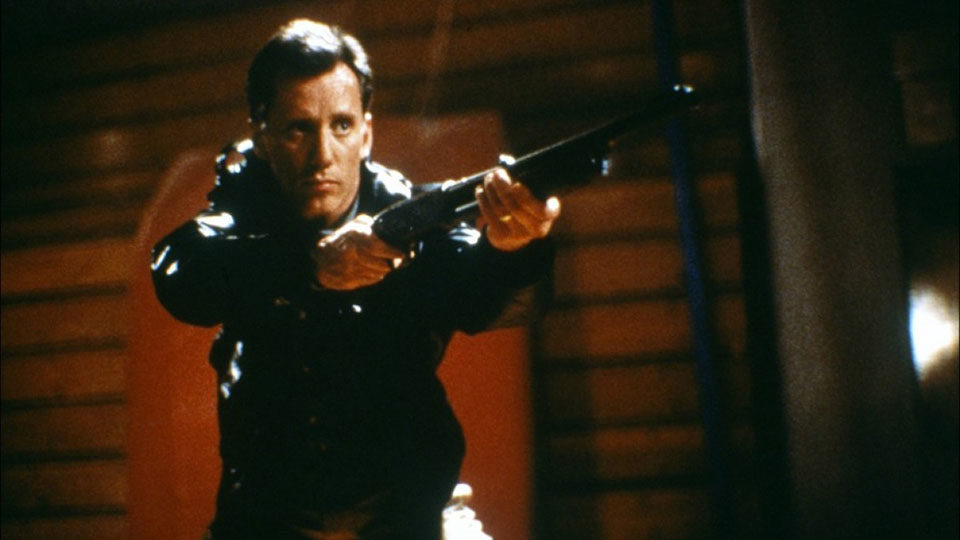
The Actor as Terrorist: James Woods interviewed
For some people it was his eccentric sociopath cop killer in The Onion Field (79). For others it was the fragile, haunted concentration-camp artist in TV’s Holocaust (78). If you were really sharp, a real gem collector, it might have been his Hollywood bottom-feeder mechanic in Night Moves (75). For me it was the otherwise unmemorable Eyewitness (81), as William Hurt’s twitchy, insecure friend Aldo: “When this guy was a kid, he must have wanted to be a suspect when he grew up,” remarks cop Steven Hill to partner Morgan Freeman as they tail Woods. Contemporary movies had gained another valuable, singular physiognomy and nervy, distinctive presence—a fresh incarnation of the humor and appeal of movie lowlife.

To be precise, his innovation and forte was self-conscious lowlife: misfits with an acute sense of self-preservation and a crumbling sense of denial. His more purely sadistic or malevolent roles, say, Against All Odds (84), are less intriguing than the off-center ones like the obsessive cult deprogrammer in Split-Image (82). In this regard, as a chronically emotionally dishonest man dedicated to telling the truth, his irresistible, Academy Award-nominated performance in Salvador was a culmination. This, in tandem with his haunting, poignant work as James Garner’s schizophrenic younger brother in the made-for-TV Promise, made 1986 a career turning point. Of his immediately subsequent roles, two stand out, and compulsive behavior figures prominently in each: the immersed-in-sleaze homicide detective tracking a serial killer in Cop (88), which Woods executive-produced; and, in the same year, The Boost’s frantic, freefalling tax-shelter salesman—a Seventies mover-and-shaker reborn as an Eighties high-flyer—who personifies the crash-and-burn excess of an era: “I can’t give less than I got, I don’t know how.”
A friend once told me, “People who live in bad neighborhoods love James Woods.” She meant people who know all Pacino’s lines in Scarface by heart, but it was a compliment. Has Woods reconciled himself to the fact that people don’t respond when he plays sensible, decent citizens like the husband in Immediate Family (89), but can’t get enough of his fast-talking live wires, sardonic creeps, and too-tightly-wrapped intensoids? These are seldom the province of stars (Jack Nicholson excepted), so does that make Woods, indisputably a leading man, a character actor, not a star? In the last few years, Woods has delivered a series of memorable, scene-stealing supporting roles—in The Specialist (94), Casino (95), and Nixon (95), a vigorous creative renewal after a period of career drift. His extraordinary evocation of Byron De La Beckwith, Medgar Evers’s assassin in Ghosts of Mississippi, caps these achievements. As the 74-year-old white supremacist, he sketches a compelling, sharply observed portrait of malign self-satisfaction, employing physicality and diction in a way rarely attempted these days. Woods’s elaborate layering of mannerisms and facial and vocal tics is far from the theatrical or merely technical, grounded in a firm sense of realistic behavior and his own shrewd sensibility. (If only Reiner’s well-meaning film were worthy of such remarkable work. More provocative and artful by far is the teaser trailer for Ghosts, an entire TV interview with Woods in character as the unrepentant racist, briefly glimpsed in the film.) In a 25-year theater, TV, and film career (his film debut: Elia Kazan’s 1972 The Visitors), Woods has long paid his dues and knows it. There’s something irrepressible about him—he keeps coming at you, finding new ways through.

Ghosts of Mississippi
How does your conception of Byron De La Beckwith differ from the real man?
What was important was embracing what I thought he was really about. He kills someone who threatens his territory, for racial reasons. The horror speaks for itself. I was more concerned with addressing an issue in the character that I personally find repugnant in life, which is how charming so many sociopaths seem to be. I’m very wary of charming people, and somebody said something that intrigued me: “One thing about old De Lay—he’s a genuine Southern gentleman, people don’t realize that about him.” When you counterpose his actions against this concocted dandy persona he has, it becomes twice as chilling. It’s like cinematic montage, combining two things to create a third idea: here’s what he does, here’s the character’s behavior, put them together and you get this creepy guy.
You play him at two different stages in his life—what sense did you have of an evolution between the two versions?
The actual transition of the character is zero in terms of his moral and emotional state. He stayed the same arrogant, self-indulgent supremacist. So I got to play him the same way on the inside and completely different on the outside, which is a little harder. People really get the physicality of a character, and they get it as an outward manifestation of the inner life of the character. So rather than just searching for an inner life by doing sense-memory and all this Method stuff, I search for it intellectually and then recreate it through the character armor, as it were. And in doing that it almost works by osmosis, backwards—by induction, the character starts to come to life. I worked on the accent, even though I always think that Northerners shouldn’t play Southerners and vice-versa, and then the makeup. I really assembled the character more than I’ve ever done in my life, brick by brick. The last day of shooting, the big scene in the bathroom, I could not find the character. We did a couple of takes and they were just terrible. It was really shocking—I’d never had that happen to me before. I literally sat there and rebuilt it on the spot line by line and put the character back together in about ten minutes. I didn’t realize how much work I had done until it failed me.
Do you have any idea why?
He’s a character who likes to pontificate, and in the bathroom scene all of a sudden I had to pull out a paper towel, take off my glasses, which was very difficult, wash my eyes, and light the cigar. Here was this sedentary, pedantic guy, and all of a sudden there was so much activity that it threw me. I wasn’t prepared for prop activity and the timing of it. And it was a different venue—he was usually sitting in a chair telling everybody what he thought about life. So I just pegged the movement with Alec [Baldwin], worked it out by rote until it was second nature.
How much do you go into figuring out why a character is the way he is?
It goes to the Heart of my fundamental beliefs about evil. I think evil is a tangible, real thing. It exists as a source in life. Part of Beckwith’s evil is this overwhelming narcissism and inflated sense of self-importance. All you have to do, if you’re me, is recreate that. I don’t think there’s a reason why—he’s just evil. Evil people are evil because they’re the only ones in the universe, they own the world and [the rest of us are] paying rent.

Cop
But for instance, Cop is premised on the idea of trying to figure out the killer’s motivation, isn’t it?
When it really comes down to it, the killer’s motivation is insane—something in a yearbook and she rejected him. He’s piecing together some kind of crazy logic, but we can never relate to that logic. Beckwith has this almost for a moment seemingly credible logic: the Bible says that the white race is here to rule over the dusky races, all this crazy stuff—there’s no explaining it.
What’s fascinating about the character is that he’s one big facade; all you see is his performance. He never drops the act, there’s no private moment, not even when the guilty verdict comes in.
I would have liked to, but in the actual footage of that moment, right on the spot they put him in handcuffs and lead to a backroom and he goes back very casually. He’s just above it all. There was nothing to show.
But there’s a reaction shot of you during the trial where he seems to be somewhere in his own private thoughts.
That was a very conscious shot; I’m glad you noticed it. I wanted to show how the sociopath thinks. Imagine you’re brought somewhere and put on trial for wearing corduroy slacks last Tuesday, and they tell you it’s a capital crime. You’d think, This is just insane, what are they talking about? And then you’d think, This is ridiculous, I’m just gonna step back from this insanity. And that’s what he does. That’s how he thinks.
Isn’t that entering the logic of how he sees the world?
Intellectually, yes. I actually thought of that consciously. A Method actor just stumbles onto something—I plan what I’m going to do. So for instance when Myrlie was testifying about what happened the night of the murder, Rob did my closeup last, and what I did was start to fall asleep and snore during the testimony. It was so awful that it was funny. Later Darrell Evers said, “He fell asleep. You were right on. How did you know that?” His attitude is—think of the most boring story somebody could tell you. He’s hearing a story about how he shot someone in the back for the color of his skin, and to him it’s, What’s the big deal? That’s a true sociopath. You can’t put yourself in the frame of mind emotionally, because I couldn’t be that person. But intellectually I could think, Well, his killing of Medgar Evers is to him what swatting a fly would be to you or me.
Where did that bit of business come from while they were waiting for the verdict where he gooses his wife?
I made that up. You know those people who think everything they’ve got is the best? He thinks flirting with her shows what a great man he is—he was so proud of the fact that his wife had been Miss Chattanooga. He thinks he’s Hugh Hefner. I thought, how can I show this guy as a kind of sybarite? He wants to live forever. His world is all his own hallucinatory creation.
Read the other four-fifths of the interview in the January/February 1997 Film Comment.







